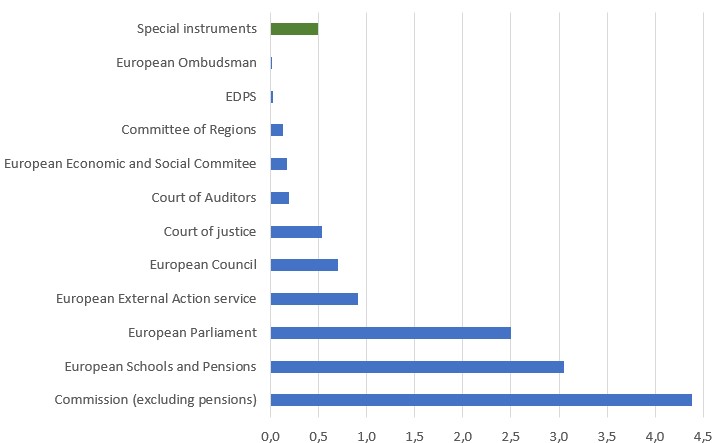Ursula von der Leyen remains President of the European Commission

Mrs Ursula von der Leyen has been entrusted by the European Parliament with the presidency of the European Commission for a further five years. Faced with the many additional challenges that lie ahead, she will have to continue to mobilise her staff, her most precious asset.
This vote expresses real confidence in the work of the Commission in a difficult context. The Institution had to take charge of and deal with the recovery plan, the health and energy crises, climate change, the wars in Ukraine and the Middle East,…
A failure by the Commission on these issues would have been catastrophic both for the people of Europe and for the institutions of the Union and their civil service, which would have been severely called into question.
Our President acknowledges that these results are also due to the ‘remarkable work’ accomplished by the Commission’s staff during her first term of office, against a backdrop of budget cuts and increasing precariousness.
‘I have never ceased to be impressed, she wrote, by your skills, your dedication, and your ability to carry out your tasks despite the pressure. Thanks to the work you do every day, you bring our Union to life.’
The staff, for their part, can be grateful for the President’s defence of the European Civil Service Statute and the refusal of the downward revision being demanded by some Member States.
Above all, they recognise that the results of the Commission’s political work have helped to defend and enhance the European civil service. We are proud to work within the EU civil service.
The European Parliament’s vote also expresses confidence in the capacity of he Institution to cope with the many challenges that lie ahead for the Union : ecological transition, responding to the wars tearing our continent and its neighbours apart, defining a more ambitious budget for the Union, creating a Europe of defence, defining an industrial policy, territorial and social cohesion, preparing for enlargement, etc.
All this against a backdrop of political fragmentation, democratic disenchantment and the rise of populism, nationalism and the far right.
To continue to mobilise staff, its most precious asset, and to serve European society, our institution must first of all win the budgetary battle. It must count on more resources than in the past, including human resources. This will enable it to work for the common good of our societies.
It will also have to continue not only to defend the Staff Regulations of the European civil service but also to respond to the profound expectations of its staff, particularly in terms of reducing the disparities and job insecurity which, since the latest reforms in particular, affect a considerable number of our colleagues.
Budget 2025: what can we expect?

Following the adoption of the draft budget for 2025 by the College on 19 June, discussions started with the Council and the Parliament. On 17 June, the Council adopted a common position on the Commission’s proposal, inviting the Commission to adopt a more prudent approach in order to leave larger margins for unforeseen events. Heading 7 remains under pressure. It also “urges all institutions to monitor and manage administrative expenditure more closely and to seek efficiency gains”.
We are very concerned that heading 7 continues to be under pressure from persistent inflation, which has a direct impact on administrative costs, in particular salaries and pensions. Faced with this situation, the administration has implemented savings measures to cover the increase in these costs, as well as the sale of 23 buildings in Brussels.
The Commission has thus maintained a very rigorous approach both for its operating budget and for the other institutions. Total expenditure under heading 7 in commitment appropriations amounts to EUR 12.6 billion, an increase of 5.2% over the 2024 budget (Table 1). Despite this increase, the deficit in heading 7 is once again made up by using the special instruments[1] provided for in the multiannual financial framework in order to comply with the legal obligations in force, i.e. not to exceed the authorised expenditure ceiling. This will also be the case in future budgets, as the additional EUR 1.9 billion requested by the Commission in the context of the mid-term review was rejected by the Council.
[1] In its common position, the Council proposes to reduce the use of the SMI (Single Margin Instrument) by €15 million, forcing the administration to make savings of the same amount.
Tabble 1 : Operating budget 2025 under heading 7 – Commission and other institutions

Source : Projet de Budget 2025
Despite cost-cutting measures, the pressure on staff due to inflation and the new tasks entrusted to the Commission without additional staff is becoming unbearable.
In these circumstances, and despite the Commission’s assurances that staff will be maintained, we remain very concerned about the outcome of the negotiations with the Council and the European Parliament, which could have a significant impact on the budgetary outlook between now and the end of the current multiannual financial framework. We are following these issues with the utmost attention and remain open to early discussions with the administration on possible measures and solutions to overcome the current budgetary impasse and meet staffing needs.
News from the Foreign Service

Following the recent elections to the European Parliament and the appointment of a new Commission, the time for change is upon us, if only because of the cascade of political changes that will follow. The consequences of a possible adjustment of inter-institutional relations will have to be taken into account, not to mention a possible revision of the Treaties in the longer term. The distribution of portfolios (new Commissioner for Defence, CSDP outside the EEAS, etc.) and competences within the College could already alter the balance and have an impact on working methods.
In addition to this unpredictable context, pragmatic and more immediate decisions are already expected on the network of delegations at a time of budgetary pressure, even if adjustments will not necessarily lead to immediate savings. In the continuing absence of a methodology for the allocation of human resources, a thorough review is essential. The distribution of staff is still essentially the result of the distribution of posts at the time of its creation, mainly between the Commission and the EEAS, which has been given the bare minimum to become operational and exercise its newly defined prerogatives. The system has worked more or less well since 2010, on the assumption that the ‘one delegation’ concept would eventually prevail, with the introduction of flexibility clauses – the famous 20% – for the use of staff and the formalisation of ‘service level agreements’ to share operational costs between the institutions. Since then, the last Work Load Assessment in Delegation (or WLAD) was carried out in 2022, with constant resources and without any real involvement of the EEAS beyond a consultation exercise. As a result, adjustments are made from year to year, essentially on the margins during the annual rotations. This system has reached its limits and is regularly questioned by the Court of Auditors, the Parliament and the Commission itself. A review of the network is currently being considered, including the possibility of closing posts, which could have a major impact on delegated staff, starting with local staff who are by definition not mobile, and also on the number of contract staff needed to achieve economies of scale. The Commission (DG INTPA) still has ambitions to continue the regionalisation process, the implications of adopting the “global gateway” concept, freeing itself from the constraints of bilateralism and the involvement of local authorities in favour of an approach favouring private investment. The plenary meetings of the Staff Committees (Outside Union and EEAS), scheduled for the week of 4 November 2024, will have to question the administration’s representatives on the state of play in this area.
In a completely different area, the implementation of the rules on working arrangements and teleworking continues to vary from place of employment to place of employment. Measures concerning local staff have still not been adopted, which is a source of uncertainty and, in some cases, further frustration for delegations. In the absence of reliable and objective data, there is a growing need for a more in-depth satisfaction survey. Lastly, the functioning of the social dialogue in the EEAS, which has already been mentioned in these columns, remains a cause for concern, as no revision of the framework agreement has been finalised to remedy the shortcomings of the current system, which is being used as a pretext for boycotts by certain organisations, prolonging a chaotic situation. The resulting hostage-taking of the system is not conducive to easing the situation. We will return to this issue in a future edition.
Start of the school year, school grants for future students: a reminder of the rules

As the school year begins, some of us will see our children off to university. Well done to them and their parents. But we think it’s important to point out a few rules that apply to all of us.
We receive a dependent child allowance and an education allowance for children attending an educational establishment. However, the Staff Regulations lay down rules on the cumulation of family allowances received from other sources (Articles 67(2) and 68(2) of the Staff Regulations), which officials and other servants must declare to the administration. These allowances are deducted from the allowances paid to them by the EU.
When the child turns 18, there are two possible scenarios:
The child stops studying. The dependent child allowance ceases. In this case, JSIS cover will also cease. For children who are not in paid employment or who are undergoing a probationary period in order to obtain national social security cover, a request can be submitted to the Settlement Office to extend the cover for a maximum of 12 months.
The child continues to study. In this case, there are two possible scenarios:
If your child is studying in the country where you work, you will receive EUR 311.65 per month.
If your child is studying more than 50 km from your place of work AND you receive the expatriation allowance, the allowance is doubled.
As always, it is important to be familiar with the additional terms and conditions:
Course attendance must be ‘full-time’. This condition is automatically deemed to be met if the institution provides the student with at least 16 hours of instruction and/or work experience per week. In cases where this number of hours is not reached, the condition is considered to be met if the studies are complete, i.e. have a purpose recognised by the State, and the person concerned follows the normal timetable for this type of study.
Benefits automatically cease at the latest on the child’s 26th birthday.
Benefits are paid monthly. If your child over the age of 18 takes a break from his or her studies, e.g. for 6 months to go travelling, he or she will not be considered as a student, will not be dependent on you and will not be covered by the JSIS for those 6 months. However, the rules for extending health insurance cover apply on request, particularly in the case of a waiting period under the new insurance scheme.
The student must still be dependent on you. If your child earns an income, you must inform your administration as this will affect your child’s entitlement to benefits. In practice:
Note that Excellence Scholarships are an exception to this rule.
The PMO tends to cut rights as quickly as possible. Why is that? In reality, the intention is good. When benefits cease to be payable, the repayment of benefits quickly adds up to significant sums which are automatically deducted from your pay in the following months (this is the famous “recovery of undue payments”). This is known as “recovery of undue payments”. So they prefer to cut your benefit automatically and reinstate it if you appeal, rather than put you in a difficult position. So don’t hesitate to contact us if you need to. This will enable us to confirm or refute the PMO’s interpretation of your particular case. After all, sometimes you need to be able to explain the situation correctly. After all, we need your feedback if we’re going to be able to pinpoint any confusing situations. But be careful (again) not to forget the time limits for appeals, which apply in all cases: 3 months after the decision giving rise to the complaint. Since appeals have to be handled carefully, it is imperative that you do not wait until the last moment to contact us.
Social dialogue in the European Parliament: a big step forward

The European Parliament and the trade unions have just concluded a new framework agreement on the organisation of social dialogue within the institution. This is good news, thanks to the new attitude of the EP administration, its staff committee and most of the trade unions. U4U had made this reform of the framework agreement one of its main demands since it started its activities at the European Parliament. Our organisation also made it one of its requirements to associate with other trade unions so as to obtain a majority within the Staff Committee.
The previous framework agreement, drawn up several decades ago, was largely inadequate. It did not include any of the new provisions of the Staff Regulations introduced by previous reforms, nor the provisions of the Charter of Fundamental Social Rights incorporated into the Treaty, nor those contained in the political declaration adopted by the Presidents of the three main institutions – Parliament, Council and Commission – proposed by President Juncker, The European Social Rights Base.
The previous framework agreement did not allow for sufficient social dialogue and therefore insufficient protection for staff. It was astonishing to see that this institution had such outdated and inappropriate procedures for social dialogue. This was not the only area where the Parliament had inadequate and reprehensible procedures. Everyone remembers the absence of a statute for parliamentary assistants, whose situation improved at the beginning of this century.
It is now up to the unions, the staff committee and the administration to prove that this new framework agreement really improves the situation of the staff.
U4U has already proposed to the other unions to hold an inter-union meeting to call for a social dialogue based on common demands. We will come back to this.
Governance of the European Agencies: where do we stand?

The European Commission is committed to improving the governance of the European agencies by taking specific measures to strengthen control, efficiency and transparency in order to ensure better compliance with the rules of the European civil service. On 3 July, the Commission met the representative trade unions for a social dialogue meeting on this issue.
In view of the continuing problems within the regulatory agencies, the European Commission has undertaken to improve the governance of the European agencies by taking specific measures to strengthen control, efficiency and transparency.
Following the note sent to Commissioner Hahn on 17 April as a joint trade union front, the Commission met the representative trade union organisations on 3 July for a social dialogue meeting entitled “Strengthening the Commission’s governance of the agencies”.
The meeting addressed a number of important issues and planned initiatives to improve the management and operation of regulatory and executive agencies. Here are the main issues discussed and our positions:
- The importance of agency governance
For U4U, the European Commission plays a crucial role in the supervision of European agencies, particularly in terms of budget implementation and social dialogue.
In this context, U4U has participated in several exchanges with the Secretariat General and DG HR to discuss more specifically the issues of interest to the agencies, since it is essential for U4U to maintain a balance between adequate supervision and the autonomy of the agencies in order to avoid two major pitfalls:
- Hands-off: i.e. taking a position that involves ignoring supervisory responsibilities and leaving executive directors to manage on their own, which can lead to unresolved problems.
- Hands-on: i.e. an excessively interventionist attitude in every decision, which is not the role of the Commission and undermines the autonomy of the agencies.
- Measures to strengthen governance
In order to improve governance, U4U recognises that some of the measures discussed above have already been proposed and even implemented by the Commission, but that others need to be strengthened:
- Network of high level representatives: A network of CEOs or Deputy CEOs has been set up to represent a strong Commission on the Boards of the Agencies. This strong presence is essential.
- Ongoing dialogue: U4U maintains an ongoing dialogue with the Assembly of Agency Staff Committees (AASC) and ensures the Commission’s presence at its annual meetings.
- Alignment of strategic plans: U4U insists that the Commission must ensure that agencies’ strategic plans are in line with available resources and are well understood by stakeholders.
- Framework agreements: U4U believes it is important to promote agreements between agencies and trade unions to ensure effective social dialogue and to avoid abuses of consultation limited to staff committees.
- Governance of the executive agencies
Executive agencies, although an integral part of the Commission, operate at a lower cost and must comply with the Commission’s rules.
However, it is clear that a number of challenges remain:
- Understaffing: There is a clear shortage of staff in some branches, which affects their efficiency.
- Weak careers: there is a need to strengthen trade union recognition and the power of staff committees.
- Practical improvements
At this stage, the Commission has taken the following actions:
- Director training: Establish training programmes for new directors on key management issues.
- Regular meetings: Organise regular meetings between DG HR and Executive Directors to discuss human resources issues, geographical and gender balance, malpractice and budget management.
- Employee surveys: Encourage managers to conduct regular employee surveys and dialogue with employee representatives and unions.
- Legal clarifications: Clarification of the role and limits of the Commission in terms of intervention in the governance of the agencies, in accordance with the founding regulations.
In conclusion, U4U believes that the governance of European agencies requires a delicate balance between supervision and autonomy. While the Commission is committed to strengthening this governance through specific measures, U4U insists on continuous dialogue and increased transparency.
Staff involvement is also essential. An exercise in direct and collective expression by staff has already proved its worth in the Barcelona and Cologne offices: the conclusions drawn by the staff have enabled subsequent social dialogue meetings to be held on the basis of concerns shared by the entire workforce, with concrete measures for improvement proposed.
All these initiatives are aimed at improving efficiency, resource management and interaction with staff, while respecting legal constraints. For U4U, improving governance requires a joint effort involving the Commission, the Boards, the Staff Committees of the Agencies and the trade unions: regular communication and close cooperation between the Commission, the Boards of the Agencies, the Staff Committees and the trade unions are essential if this complex undertaking is to succeed. U4U has asked for a first communication on this approach to be published…
SCIC, hybrid meetings: agreement on a pilot phase

At SCIC, the Interpreters’ Delegation and management reached agreement on 12 July on a pilot phase for hybrid platform meetings (meetings with on site and remote participation).
As a reminder, the negotiations lasted nearly a year, with a break of almost 3 months and a unilateral cessation of negotiations decreed at the end of May by the Director General. Thanks to a letter from all trade unions and, above all, thanks to the Resolution of the General Assembly of Staff Interpreters and a vote of support from the AIC[1] interpreters, negotiations resumed and on 12 July they finally resulted in an agreement on a pilot phase.
Unfortunately, despite the insistence of the Interpreters’ Delegation, the basic problem, the potentially deleterious sound of the platforms, dangerous to hearing health, has not been resolved in the text.
As the SCIC hierarchy has always claimed that the blocking factor was at a higher level, it is to be hoped that the post of Commissioner responsible for SCIC will be filled by someone who is sensitive to health and safety at work and has the courage to resolve the problem at its root.
In the current situation, the only option was to limit exposure.
The agreement reached is certainly not an ideal one, but all the elements are in place for the approach to work, provided that certain voids are filled in before the start of the pilot phase on November 1. The Protocol on sound and the Protocol on the monitoring of auditory pathologies will have to be completed, and solutions will still have to be found for the areas currently excluded from the agreement: it is essential that interpreters be protected in all the institutions where they work (i.e. the Commission, the ESCE, the CoR and also the Council) as well as in the areas that are currently exempt, namely missions, audits, screenings, consecutive and rare language profiles. It is to be hoped that a satisfactory solution will be found by 1 November.
The text of the agreement will be submitted to the interpreters for approval at a General Assembly at the end of September, with a second vote planned for the end of the pilot phase at the end of April.
[1] AIC : Agents for conference interpreting (Agents Interprètes de Conférences)
Should we bury the Luxembourg housing allowance?

As we informed you in various communications earlier this year, colleagues living and working in Luxembourg face a much higher cost of living than those working in Brussels, but receive the same salary as the latter. Contrary to the situation in all other cities inside and outside the EU, the Staff Regulations formally stipulate that colleagues working in Luxembourg receive exactly the same salary as those working in Brussels (this common salary in Brussels and Luxembourg is considered as the “base 100” for calculating salary adjustments to the cost of living in other places of work).
In order to deal with this situation, and given that the cost of housing, both to buy and to rent, is a particularly burdensome item of expenditure in Luxembourg, we defended the introduction of a housing allowance for the colleagues concerned.
The possibility of introducing this allowance had been the subject of discussions between the administrations concerned (Parliament, Commission, Court of Justice and Court of Auditors), which had agreed on a draft along these lines, although the amounts proposed were much lower than those we had proposed and did not apply to all staff.
Following these discussions, the Commission included an amount of €10.42 million in its draft budget for 2025 (equivalent to 0.005% of the total amount of the proposed budget).
This was without taking into account the Council’s eagerness to cut staff budgets. The Ministers have indeed recently adopted a position including the total removal of this amount from the 2025 budget.
Does this mean that the housing subsidy project has been shelved for good? We believe that this measure can still be saved if we get involved.
It’s now up to Parliament to take a position on the project, and it’s not necessarily a foregone conclusion.
Behind the budgetary issues, there are real questions of principle, in a context where we know, for example, that some of our colleagues are very much disadvantaged.
The Council’s reluctance to finance a measure which the institutions with staff in Luxembourg would like to see, and which simply aims to rebalance the rights of these staff in relation to their colleagues in Brussels, also risks dealing a real blow to the efforts being made to improve the attractiveness of the European institutions in Luxembourg.
As we have no illusions about a possible change in the Council’s position, we call on both the Commission and all Members of the European Parliament who are committed to a strong and effective European Union, able to rely on an efficient civil service, to make every effort to fight for the restoration of this item of expenditure.
The financial resources earmarked for staff are not simply an adjustment variable that can be used to make savings at any price. On the contrary, it is an essential investment in the future of our Union.
We will propose to the other trade unions that they work together in this direction.
Promotion exercise: an interim assessment

As is the case every year, the summer holiday period was a period of intensive work for staff representatives, including those delegated by our organisation, devoted to examining appeals on the promotion files of colleagues whose names had not been put forward by their Directors General. As a reminder, this decision by the DGs was preceded by meetings with staff representatives, who could intervene to propose that colleagues who had not been promoted be promoted.
At the beginning of September, the two working groups (one for ASTs and AST/SCs and the other for ADs) responsible for examining the appeal files and the “exceptional request” files submitted by the Directors-General themselves were finally able to hold discussions between the staff representatives and the management. Hundreds of files had to be examined in detail and compared by the colleagues concerned.
Appeals are examined on the basis of the same criteria as at Directorate-General level (performance, competence and conduct on the one hand, and responsibilities exercised and languages spoken on the other), but for all Commission staff. It is therefore a rigorous and demanding task.
The results of the deliberations of these working groups must then be validated by the Joint Promotion Committee, which forwards them to the authority responsible for taking the final and formal promotion decisions, i.e. the Director General of Human Resources.
As this work draws to a close, and as the promotion process is one of the most criticised processes and one which causes the most disappointment each year, it seems a good time to take stock of how the process is working.
The great advantage of this procedure over its predecessors is undoubtedly that it makes the appraisal procedure more independent of the promotion procedure. The older among us may remember the old system based on “points” that were accumulated year after year in a “rucksack”. One of the consequences of this old system was that some colleagues would occasionally receive appraisals which rated the quality of their work as ‘good’ or even ‘average’, when they would have deserved a ‘very good’ appraisal, simply because their department did not have the opportunity to promote them that year. The appraisal process was therefore sometimes used as a simple adjustment variable to match the promotion opportunities available. The same was true of the next system, based on merit groups, where colleagues changed merit groups just to allow others to be promoted.
In addition to the demotivation that could result from not being promoted, there was also the demotivation of receiving an evaluation that did not reflect the true quality of the work done.
The system introduced more than ten years ago has enabled us to escape this trap by guaranteeing an average length of service and applicable promotion rates for each grade. It allows us to recognise the individual merits of each person during the appraisal process, and to base promotion no longer on a concept of merit based on the accumulation of points, but on a more dynamic principle of comparing merits. The existence of “collective guarantees” (average promotion time) and the strict application of Annex 1B to the Staff Regulations, which sets out the budget and its application, provide additional guarantees.
The fact that 5% of the available promotion quotas are reserved for a so-called “appeal procedure”, in which a new comparison of merits is made, this time at the level of the Commission (and no longer at the level of each individual DG), also plays an important corrective role and ensures greater objectivity in the process.
Finally, it should be noted that the whole process is subject to a joint evaluation after the event so that any problems can be rectified.
However, as we come to the end of this process, this is undoubtedly a good time to take a brief look at some of the issues that still need to be addressed in order to implement this new system. These issues will be brought to the attention of the Central Staff Committee and the Joint Appraisal and Promotion Committee.
One of the most important of these is undoubtedly the wide variety of styles and approaches used by the managers responsible for producing appraisal reports. Since these reports are the basis for comparing merits in the areas mentioned above, this obviously poses a number of difficulties for the process of comparing merits. This phenomenon is not only a matter of individual preferences or national cultures, but can also be observed almost systematically in certain Directorates-General.
The same applies, of course, to the natural modesty that leads some colleagues to under-emphasise their own merits in their self-evaluation, contenting themselves with a list of tasks they have carried out during the year, without highlighting their successes, qualities and achievements.
A lack of interest or investment in the appraisal process by some colleagues or managers is also not without its difficulties. These difficulties were to some extent exacerbated by the possibility of ‘carrying over’ one’s report from one year to the next.
The impact that a certain number of prejudices can sometimes have (e.g. towards part-time workers or colleagues in poor health), the consideration of reputations or memories of bad experiences in the past, or even a deteriorated relationship between an employee and his or her hierarchy can also have undesirable effects on the quality of appraisals.
In discussions between staff representatives and the various Directors-General prior to their decisions on promotions, we sometimes hear that “the written content of the report does not fully reflect reality” in order to justify a delay in promotion compared to the average length of service of a colleague whose reports are excellent. This lack of consistency is obviously problematic when the case reaches the appeal stage.
There is therefore considerable room for improvement in the promotion and appraisal systems and we will continue to raise this issue both at union level and in the relevant joint committees on which we are represented.
U4U, serving you better!

| U4U’s main resolution is to serve you even better. To achieve this, we have created direct links between you and the team that can best help you. So … : – If you require personal support, please email to HR-REP-PERS-U4U-ASSISTANCE-INDIVIDUELLE@ec.europa.eu – If you would like information about training or coaching, please email to training.u4u@gmail.com – If you would like to contact colleagues in Luxembourg, please email to rep-pers-osp-u4u-lu@ec.europa.eu – If you would like to contact colleagues in the European Parliament, please email to u4u@europarl.europa.eu – If you wish to contact colleagues in the External Service, please email to u4unity@eeas.europa.eu – If you have any other questions, please send an email to our general mailbox: rep-pers-osp-u4u@ec.europa.eu We invite you to visit our website frequently and to join our Facebook page so that you have easier access to the latest news from the union about the training/coaching/workshops on offer, the conferences/cultural walks in Brussels and the events we organise throughout the year, as well as more general information about our statutes and our articles and reflections on the issues that concern us all. |